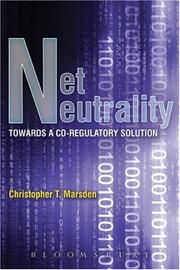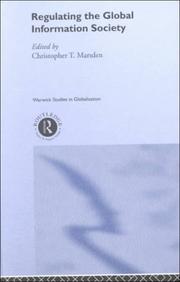| Listing 1 - 10 of 14 | << page >> |
Sort by
|
Book
Year: 1947 Publisher: London : Collins,
Abstract | Keywords | Export | Availability | Bookmark
 Loading...
Loading...Choose an application
- Reference Manager
- EndNote
- RefWorks (Direct export to RefWorks)
Health resorts --- Summer resorts --- England --- Social life and customs.
Book
ISBN: 9781107003484 1107003482 9780511763410 1139097547 1107220777 1139103393 9786613341839 1139100939 1139101595 113909890X 1283341832 0511763417 1139099582 9781139100939 9781283341837 9781139101592 9781139099585 Year: 2011 Publisher: Cambridge: Cambridge university press,
Abstract | Keywords | Export | Availability | Bookmark
 Loading...
Loading...Choose an application
- Reference Manager
- EndNote
- RefWorks (Direct export to RefWorks)
Chris Marsden argues that co-regulation is the defining feature of the Internet in Europe. Co-regulation offers the state a route back into questions of legitimacy, governance and human rights, thereby opening up more interesting conversations than a static no-regulation versus state regulation binary choice. The basis for the argument is empirical investigation, based on a multi-year, European Commission-funded study and is further reinforced by the direction of travel in European and English law and policy, including the Digital Economy Act 2010. He places Internet regulation within the regulatory mainstream, as an advanced technocratic form of self- and co-regulation which requires governance reform to address a growing constitutional legitimacy gap. The literature review, case studies and analysis shed a welcome light on policymaking at the centre of Internet regulation in Brussels, London and Washington, revealing the extent to which states, firms and, increasingly, citizens are developing a new type of regulatory bargain.
Internet --- Computer networks --- Réseaux d'ordinateurs --- Law and legislation --- Management --- Law and legislation. --- Droit --- Gestion --- Cyberspace --- Communication systems, Computer --- Computer communication systems --- Data networks, Computer --- ECNs (Electronic communication networks) --- Electronic communication networks --- Networks, Computer --- Teleprocessing networks --- Data transmission systems --- Digital communications --- Electronic systems --- Information networks --- Telecommunication --- Cyberinfrastructure --- Electronic data processing --- Network computers --- DARPA Internet --- Internet (Computer network) --- Wide area networks (Computer networks) --- World Wide Web --- Distributed processing --- Réseaux d'ordinateurs --- Law --- General and Others --- Internet - Law and legislation - Europe --- Computer networks - Law and legislation - Europe --- Internet - Law and legislation --- Computer networks - Law and legislation

ISBN: 1849660069 9786612894626 1849663572 1282894625 1849660379 1472521528 Year: 2010 Publisher: London : Bloomsbury Academic,
Abstract | Keywords | Export | Availability | Bookmark
 Loading...
Loading...Choose an application
- Reference Manager
- EndNote
- RefWorks (Direct export to RefWorks)
Net Neutrality is a very heated and contested policy principle regarding access for content providers to the Internet end-user, and potential discrimination in that access where the end-user's ISP (or another ISP) blocks that access in part or whole. The suggestion has been that the problem can be resolved by either introducing greater competition, or closely policing conditions for vertically integrated service, such as VOIP.However, that is not the whole story, and ISPs as a whole have incentives to discriminate between content for matters such as network management of spam, to secure and maintain customer experience at current levels, and for economic benefit from new Quality of Service standards. This includes offering a 'priority lane' on the network for premium content types such as video and voice service. The author considers market developments and policy responses in Europe and the United States, draws conclusions and proposes regulatory recommendations.
Broadband communication systems -- Law and legislation. --- Internet -- Government policy. --- Network neutrality. --- Telecommunication policy. --- Internet. --- Network neutrality --- Right to Internet access. --- Digital divide. --- Divide, Digital --- GDD (Global digital divide) --- Global digital divide --- Information society --- Internet access, Right to --- Human rights --- Telecommunication --- Telecommunication and state --- Internet neutrality --- Net neutrality --- Internet governance --- Telecommunication policy --- DARPA Internet --- Internet (Computer network) --- Wide area networks (Computer networks) --- World Wide Web --- Government policy --- Internet

ISBN: 1134548001 1280141816 0203988892 9780203988893 0415242177 9780415242172 0415242185 9780415242189 9781134548002 9781280141812 9781134547951 9781134547999 1134547994 Year: 2000 Publisher: London ; New York, NY : Routledge,
Abstract | Keywords | Export | Availability | Bookmark
 Loading...
Loading...Choose an application
- Reference Manager
- EndNote
- RefWorks (Direct export to RefWorks)
An outstanding line-up of contributors explore the regulation of the internet from an interdisciplinary perspective. In-depth coverage of this controversial area such as international political economy, law, politics, economics, sociology and internet regulation. Regulating the Global Information Society covers the differences between both US and UK approaches to regulation and establishes where policy is being made that will influence the future direction of the global information society, from commercial, democratic and middle-ground perspectives.
Computer networks --- Telecommunication --- Digital communications. --- Information society. --- Sociology --- Information superhighway --- Communications, Digital --- Digital transmission --- Pulse communication --- Digital electronics --- Pulse techniques (Electronics) --- Digital media --- Signal processing --- Freedom of information --- Trade regulation --- Cyberspace --- Law and legislation. --- Digital techniques --- Law and legislation --- Digital communications --- Information society --- #SBIB:309H1015 --- #SBIB:309H1710 --- Media: politieke, juridische, ethische, ideologische aspecten (incl. privacy) --- Telematica, algemene werken

ISBN: 9781849660068 Year: 2010 Publisher: London : Bloomsbury Academic,
Abstract | Keywords | Export | Availability | Bookmark
 Loading...
Loading...Choose an application
- Reference Manager
- EndNote
- RefWorks (Direct export to RefWorks)
Book
ISBN: 1526105470 1526105489 9781526105486 Year: 2017 Publisher: Manchester: Manchester University press,
Abstract | Keywords | Export | Availability | Bookmark
 Loading...
Loading...Choose an application
- Reference Manager
- EndNote
- RefWorks (Direct export to RefWorks)
Net neutrality is the most contested Internet access policy of our time. This book offers an in-depth explanation of the concept, addressing its history since 1999, its engineering, the policy challenges it represents and its legislation and regulation. Various case studies are presented, including Specialized Services and Content Delivery Networks for video over the Internet, and the book goes on to examine the future of net neutrality battles in Europe, the United States and developing countries, as well as offering co-regulatory solutions based on FRAND and non-exclusivity. It will be a must-read for researchers and advocates in the net neutrality debate, as well as those interested in the context of communications regulation, law and economic regulation, human rights discourse and policy, and the impact of science and engineering on policy and governance.
Book
Year: 2017 Publisher: Manchester University Press
Abstract | Keywords | Export | Availability | Bookmark
 Loading...
Loading...Choose an application
- Reference Manager
- EndNote
- RefWorks (Direct export to RefWorks)
This study explains the concept of network neutrality and its history as an extension of the rights and duties of common carriers, as well as its policy history as examined in US and European regulatory proceedings from 1999. The book compares national and regional legislation and regulation of net neutrality from an interdisciplinary and international perspective. It also examines the future of net neutrality battles in Europe, the United States and in developing countries such as India and Brazil, and explores the case studies of Specialized Services and Content Delivery Networks for video over the Internet, and zero rating or sponsored data plans. Finally, Network neutrality offers co-regulatory solutions based on FRAND and non-exclusivity. This is a must-read for researchers and advocates in net neutrality debate, and those interested in the context of communications regulation, law and economic regulation, human rights discourse and policy, and the impact of science and engineering on policy and governance.
Network neutrality --- Law and legislation --- network --- law --- governance --- regulation --- policy --- internet --- data --- frand --- communications --- neutrality --- content delivery networks --- human rights --- specialized services
Book
Year: 2017 Publisher: Manchester University Press
Abstract | Keywords | Export | Availability | Bookmark
 Loading...
Loading...Choose an application
- Reference Manager
- EndNote
- RefWorks (Direct export to RefWorks)
This study explains the concept of network neutrality and its history as an extension of the rights and duties of common carriers, as well as its policy history as examined in US and European regulatory proceedings from 1999. The book compares national and regional legislation and regulation of net neutrality from an interdisciplinary and international perspective. It also examines the future of net neutrality battles in Europe, the United States and in developing countries such as India and Brazil, and explores the case studies of Specialized Services and Content Delivery Networks for video over the Internet, and zero rating or sponsored data plans. Finally, Network neutrality offers co-regulatory solutions based on FRAND and non-exclusivity. This is a must-read for researchers and advocates in net neutrality debate, and those interested in the context of communications regulation, law and economic regulation, human rights discourse and policy, and the impact of science and engineering on policy and governance.
Network neutrality --- Law and legislation --- network --- law --- governance --- regulation --- policy --- internet --- data --- frand --- communications --- neutrality --- content delivery networks --- human rights --- specialized services
Book
Year: 2017 Publisher: Manchester University Press
Abstract | Keywords | Export | Availability | Bookmark
 Loading...
Loading...Choose an application
- Reference Manager
- EndNote
- RefWorks (Direct export to RefWorks)
This study explains the concept of network neutrality and its history as an extension of the rights and duties of common carriers, as well as its policy history as examined in US and European regulatory proceedings from 1999. The book compares national and regional legislation and regulation of net neutrality from an interdisciplinary and international perspective. It also examines the future of net neutrality battles in Europe, the United States and in developing countries such as India and Brazil, and explores the case studies of Specialized Services and Content Delivery Networks for video over the Internet, and zero rating or sponsored data plans. Finally, Network neutrality offers co-regulatory solutions based on FRAND and non-exclusivity. This is a must-read for researchers and advocates in net neutrality debate, and those interested in the context of communications regulation, law and economic regulation, human rights discourse and policy, and the impact of science and engineering on policy and governance.
Network neutrality --- network --- law --- governance --- regulation --- policy --- internet --- data --- frand --- communications --- neutrality --- content delivery networks --- human rights --- specialized services --- Law and legislation
Book
ISBN: 9780262018821 9780262312943 0262312948 0262018829 Year: 2013 Publisher: Cambridge: MIT Press,
Abstract | Keywords | Export | Availability | Bookmark
 Loading...
Loading...Choose an application
- Reference Manager
- EndNote
- RefWorks (Direct export to RefWorks)
Computer networks --- Programming languages (Electronic computers) --- Internet --- Information policy. --- Réseaux d'ordinateurs --- Langages de programmation --- Information --- Law and legislation. --- Droit --- Politique gouvernementale --- Information policy --- Law and legislation --- Information science --- Information services and state --- Communication policy --- Cyberspace --- Computer languages --- Computer program languages --- Computer programming languages --- Machine language --- Electronic data processing --- Languages, Artificial --- Government policy --- Réseaux d'ordinateurs --- Computer networks - Law and legislation --- Internet - Law and legislation
| Listing 1 - 10 of 14 | << page >> |
Sort by
|

 Search
Search Feedback
Feedback About UniCat
About UniCat  Help
Help News
News